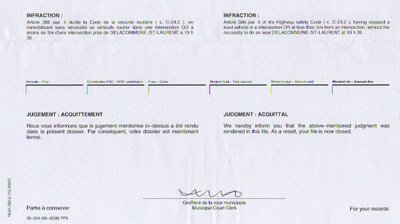There's a self-deprecating aphorism that Canadians hang onto: As American as apple pie and as Canadian as possible under the circumstances. (We can thank
Heather Scott for it.)
One of the fine divisions between American and Canadian culture is the approach to government. Canadians trust government, Americans, by definition in the founding documents and in modern culture, are suspicious of it. Canadians love our universal health care. We don't mind the reasonable restrictions on free speech that many Americans consider abominable. We're willing to live safer lives within the embrace of our doting government.
At least, it was that way until 2001.
I don't want to rehash issues that thousands have analyzed before. I don't want to wade into the mire of debate concerning liberty and privacy versus security. We know it exists, and we have our opinions, and none of those matter for the point of this post.
For as long as I can remember, Canadians could cross the border into the US with a photo ID such as a driver's licence, but that changed this decade and then we needed passports. The requirement for cross-border travel has grown to include
NEXUS cards, awarded after a comprehensive security investigation, and the two countries have agreed to expand the document requirement to include - wait for it - driver's licences.
Ah, but these aren't the same old lower-case driver's licences. These are capitalized
Enhanced Driver Licences, EDLs. EDLs will serve as proof of citizenship and identity, and the American
Department of Homeland Security mandates that each card contain a RFID chip that broadcasts its information up to 10 metres away.
British Columbia is the only province to issue EDLs so far, some 500 as part of a pilot project. Monday's Gazette contained a
report on it.
There's a problem with the Gazette article, however. It buries the lead. The first seven paragraphs focus on the issue of card design. B.C.'s cards contain a maple leaf to indicate Canadian identity - but will Quebec's? Oh, dear. I must stop biting my fingernails over that one.
No, keep reading to find the lead in paragraph #14:
"The Americans are demanding a vicinity chip," [said David Loukidelis, B.C.'s information and privacy commissioner]. But the B.C. pilot project has developed a "low-tech fix" in the form of a plastic sleeve that prevents authorities, or identity thieves, from reading the card.
Wow. Loukidelis has no issue with the cards containing encoded information, but he prefers a more secure swipe-card system. To harvest information from your RFID chip, all a person need do is bring a receiver within spitting distance. The receiver could be in a backpack and your card in your wallet, but the information stored in your RFID would be shared. One hopes that ID cards with RFIDs would contain only encrypted data, but nobody has yet invented unbreakable encryption. To take that information from a swipe card, authorities or identity thieves would have to physically swipe the card.
So Loukidelis has gotten B.C.'s EDL project to develop a sleeve that will block a card's RFID transmissions. Sure, such sleeves exist and no one is stopping any EDL holder from buying one. But this is a government that looks like it will actively provide a measure of privacy for its citizens, ironically pushed to do so by the one country that boasts freedom and liberty as its hallmarks. Thank you, nanny state. That's the story.
Only in Canada, eh?




